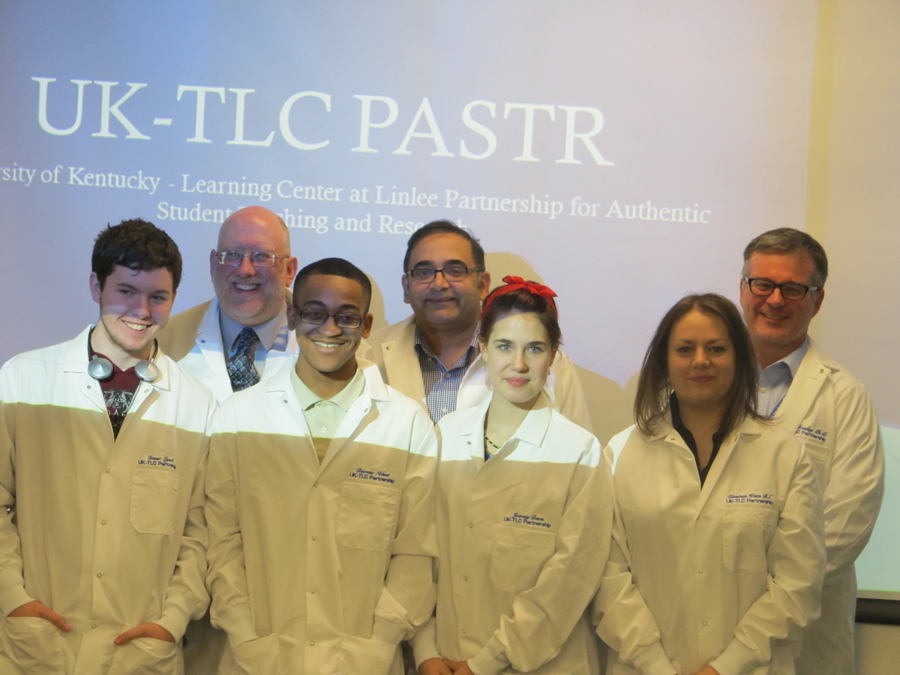UK-TLC Partnership Nurtures Promising Young Science Students
Not all learning experiences are created equally – and at the Learning Center at Linlee, an innovative partnership with the University of Kentucky College of Medicine allows young students to get rich, hands-on experience in the sciences and better their chances of succeeding in college and beyond.
As part of the Fayette County Public School System, The Learning Center (TLC) is an alternative school for at-risk students who are facing personal challenges that might impede their ability to learn. These include socioeconomic factors, and, perhaps surprisingly, intellectual giftedness. Students may struggle inside a traditional classroom because the learning style or pace isn't matched to their capabilities.
At TLC, the teaching style is adaptable, says Scott Diamond, a TLC science teacher and adjunct assistant professor of physiology at UK.
"I have the freedom to try whatever it takes to make it work," Diamond said. "And I have the freedom to stop when it doesn't work."
Through the new UK-TLC Partnership, Diamond and his colleagues at TLC and the UK College of Medicine are able to offer a truly immersive experience for students looking for a career in the sciences – the chance to work with college faculty and trainees to gain experience working in a real laboratory on real-world problems.
A chance meeting brought the UK-TLC Partnership to life – Diamond met up with UK's Anthony Sinai, a professor in the Department of Microbiology, Immunology, and Molecular Genetics, and Luke Bradley, associate profesor of anatomy and neurobiology, who were both looking for ways to provide undergraduates and high school students with meaningful research experiences.
"We wanted to allow them an opportunity to learn something different, but that's also meaningful and real science, rather than repetitive work," Sinai said.
At TLC, students are able to conduct their own experiments with guidance from their teachers. They come to UK several days per month, where they elevate their experiments using more sophisticated equipment and procedures in the university's labs. Working on their projects with both UK faculty and student instructors, the TLC students are given the chance to perform at a high level and to form relationships with real scientists.
"What we're really trying to do is take at-risk kids and treat them like the gifted individuals they are, like grad students," Diamond said.
At the same time, the closeness in age between the TLC students and their UK student mentors allows for a closer bond, says Jessica Gambrel, an agriculture biotechnology major who works in Bradley's lab. Gambrel and Elizabeth Watts, a technician in the Sinai laboratory, are both the first in their families to attend college – serving as ideal near-peer role models to the TLC students
"I can work with them and say, this is how we do these things, sure, let's mix some plates to grow some bacteria," Gambrel said. "But also, I think they can come to me and say, 'I'm really nervous about college, do you have any advice about applying?' Things like that."
TLC's overall student population is nearly 200 of Fayette County’s most at-risk students, and this year's inaugural class of the UK-TLC Partnership saw three students earn their coveted white coats. As a TLC science teacher, Diamond recruits students into the partnership, looking for kids who show an interest and passion for science. While there's room to grow the program, the classes will remain small to give each student the individualized attention he or she deserves.
Newly graduated TLC student Ceaser Lynch has already become an undergraduate summer researcher in Sinai’s lab at UK. He'll be attending UK as a freshman in the fall, and will experience a role reversal when he continues working for UK-TLC from the mentoring side. He describes the program as a "family" atmosphere that helps prepare its students for a brighter future.
"It's more personalized," Lynch said. "They're trying to build you up to the career you want to go into."
The TLC students aren't the only ones who benefit from this partnership. Bradley notes that playing the role of mentor is beneficial to both parties involved.
"The greatest way to learn is by teaching," he said. "And so our students at UK will actually become much stronger in the lab through this exposure to teaching the high school students at TLC."
Bessie Guerrant of the UK's Office of Undergraduate Research and the UK College of Medicine Dean’s Office have provided support for the school's laboratory in the form of supplies and equipment – much of it surplus that would otherwise be sold for scrap. The laboratory space at TLC was recently dedicated in a ribbon-cutting ceremony presided on by Rebecca Dutch, the UK College of Medicine's Associate Dean for Biomedical Education, cementing what promises to be a long-term relationship benefiting both TLC and UK.
Overall, the goal of the UK-TLC Partnership is to foster an appetite in the science fields for many students who may have otherwise felt such a career was beyond their reach. Inspiring young minds to keep asking questions and stay hungry for knowledge is a big part of what motivates the faculty to continue to push and improve the new partnership.
"I think the important thing to realize here is that by providing opportunities to students, it's incredibly enriching to see the spark where perhaps we saw the spark in ourselves 25 or 30 years ago," Sinai said. "When you see that, it's quite invigorating, and reminds us why we are doing this in the first place."
